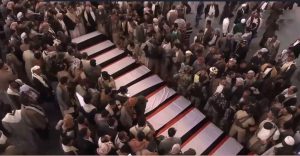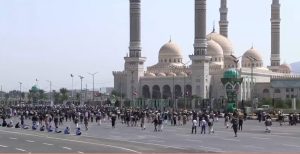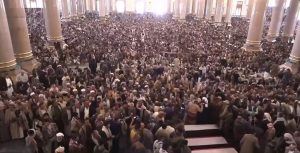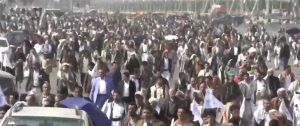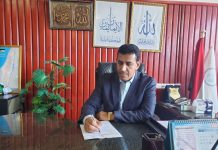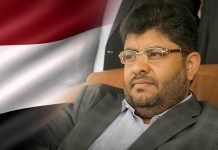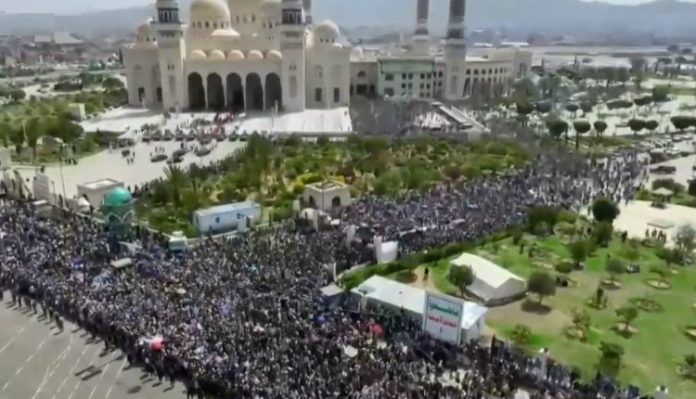A mass funeral was held Monday morning in Al-Sabeen Square in the Yemeni capital, Sana’a, for Prime Minister Ahmed Ghaleb Al-Rahwi and several ministers and senior officials of the Sanaa-based government, who were killed in a treacherous Israeli airstrike last Thursday.
Yemenis flocked to Al-Sabeen Square in the Yemeni capital, Sanaa, with the funeral prayers being held at Shaab Mosque and broadcast by Al-Masirah TV.
Crowds inside the mosque chanted against the Zionist entity and the United States as they mourned the deaths of the officials.
The officials killed in the strike included:
- Ahmed Ghaleb Nasser Al-Rahwi – Prime Minister
- Jamal Ahmed Ali Amer – Minister of Foreign Affairs and Expatriates
- Mohammed Ali Ahmed Al-Mawlid – Minister of Youth and Sports
- Ali Saif Mohammed Hassan – Minister of Electricity, Energy, and Water
- Ali Qasim Hussein Al-Yafaei – Minister of Culture and Tourism
- Radwan Ali Ali Al-Rubai – Minister of Agriculture and Fisheries
- Samir Mohammed Ahmed Bajalah – Minister of Social Affairs and Labor
- Hashim Ahmed Abdulrahman Sharaf El-Din – Minister of Information
- Moein Hashem Al-Mahaqri – Minister of Economy, Industry, and Investment
- Mujahid Ahmed Ali – Minister of Justice
- Mohammed Qasim Mohammed Al-Kabsi – Director of the Prime Minister’s Office
- Zahed Mohammed Al-Amadi, Secretary of the Council of Ministers
Yemen’s Grand Mufti Sheikh Shamsaddine Sharafaddine addressed the funeral, hailing the martyrs who sacrificed their lives in support of the homeland and Palestine.
For his part, Caretaker PM Mohammed Meftah stressed that the assassination of the senior officials won’t succeed in destabilizing the Yemeni state, vowing that their blood will fuel further determination and action in confronting “the futile aggression.”
Speaking from Al-Sabeen Square, Deputy Minister of Information Mohammed Mansour said the slain officials represented a cross-section of the Yemeni political and social landscape.
“These sacrifices send a powerful message, especially to people in the southern provinces, that dignity and sovereignty today stem from Sana’a—not from Abu Dhabi or Riyadh,” he said.
Mansour emphasized that their martyrdom highlights Yemen’s united stance in support of the Palestinian cause and opposition to what he called the US-Israeli agenda in the region. “These are not just martyrs of Yemen, but martyrs of Palestine as well,” he added, describing the slain officials as “blood messages from Sana’a to Gaza.”
He also noted that Mahdi al-Mashat, head of the Supreme Political Council in Sana’a, had vowed retaliation.
According to Mansour, the Yemeni armed forces responded by targeting an Israeli vessel in the northern Red Sea, in what the Ministry of Defense described as a “clear and painful message.”
Mansour further stated: “For nearly two years, Yemenis from Raymah, Saada, Abyan, and Hadhramaut have offered their blood for Palestine. This unified geography is the strongest answer to division and the clearest proof of a shared identity and common enemy.”
He concluded by describing the fallen Prime Minister and ministers as public servants killed while delivering services under blockade and aggression, urging all Yemenis to join what he called the national liberation movement led by Sana’a.
